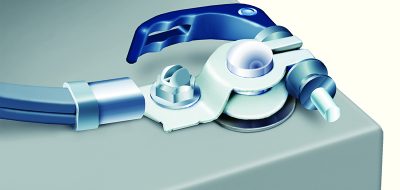Dear RV Doctor,
My parents have a 1990 Cobra Class A motorhome with a problem. There is something going on between the alternator and the battery; the battery will not hold a charge. If you use the wipers or headlights or anything like that while driving you lose battery power until the whole thing dies. They have replaced the alternator, the battery and (we believe) the inverter, yet the problem persists. They currently have the whole thing jerry-rigged with a battery charger that is hooked into the generator. Any thoughts on what else could be causing the problem?
–Kelly Barnes, (Brunswick, OH)
Answer:
Kelly, battery problems seem to ever nag us. The first step in finding out why batteries seemingly discharge quickly is to analyze the battery itself. Severely sulfated batteries simply will not hold a charge compared to newer, fresher batteries. The degree of sulfation is proportionate to its ability to hold a charge. All batteries self-discharge, but sulfated plates quicken the rate. Find a shop in your area that has a carbon-pile battery load tester. This test will provide insight to the internal happenings of the battery.
Clean and tight electrical connections are also extremely important. Corrosive terminals and faulty butt splices and other connections all lead to early capacity loss. Also, determine if the battery has indeed been fully charged. Chances are the battery has not been given a chance to become completely charged. Motorhomes of that vintage are notorious for employing mediocre or even inadequate charging systems, including an undersized alternator. (A fully charged battery is one that, during an independent charging process, maximizes the specific gravity reading and then plateaus. In other words, the specific gravity refuses to rise any higher. After two hours in that state, the battery is then considered fully charged). After the battery has been tested, then focus on the alternator itself. Alternators and convertor/chargers back then did not have the technical algorithms available today for proper and complete automatic battery charging.
Tests should also be performed on the individual battery circuits to determine if any drains exist. Some small, parasitic drains are normal, but when current leakages approach 700-800 milli-amps, something needs to be rectified. Obviously, a larger drain on a battery is even worse. A qualified professional RV technician can easily perform this test for you. There is good news, however. Today there are aftermarket alternators and convertor/chargers that increase the RVer’s ability to extend the electrical life in the batteries. Also, newer battery technology has improved battery performance and has minimized over-charging risks. It should be a consideration for all “serious” RVers of older coaches to upgrade to high-tech batteries, sophisticated three-step chargers and high output automotive alternators. Electrical woes will certainly be minimized and under proper usage, can be completely eliminated.
(Please feel free to comment, however, please also note that due to the volume of communications I receive from multiple channels I cannot guarantee a personal response in every instance. However, questions of an overall general interest may be considered and published in an upcoming RV Doctor column.)



Pingback: site
Jane Handlin
Question on the Aqua Hot system. Do you have to have the water tanks full to be able to use the aqua hot for heating the coach? Or is it just the water and antifreeze solution that is already in the aqua hot itself that does the circulation. We just got the coach and are trying to learn about its use. The books are not very clear on much. Thanks
Jane Handlin
Question on the Aqua Hot system. Do you have to have the water tanks full to be able to use the aqua hot for heating the coach? Or is it just the water and antifreeze solution that is already in the aqua hot itself that does the circulation. We just got the coach and are trying to learn about its use. The books are not very clear on much. Thanks
Larry Ray
Re: RV Doctor-battery won’t hold a charge.
Kelly, I have a battery load tester that also shows the charging system condition if the engine is running while it is connected.
Larry Ray
Larry Guthrie
Check the connections especially at the battery. Anything that draws a lot of current requires a good clean connection. I’ve personally had my jacks fail to work when the interior lights worked fine. Cleaned the connections and the jacks worked fine.
If you like to spend money or like being frustrated don’t check the connections!
Larry
Tom Hargreaves
Gary has some great advice, here. I’d like to add a couple of suggestions, though.
Is there just one battery in this rig? If not, the battery isolator could probably stand a look to make sure it is hooked up properly and functioning. Also don’t forget to check for adequate wire size and continuity. Although installed wire size would be a secondary issue with respect to your main problem, if any of the wires to/from the battery have been broken inside the insulation (as from too much flexing or vibration, for instance), you might have an effectively smaller wire if just a few strands remain connected, or you could have no connection at all if the wire were internally separated completely.
I might also suggest trying a few simple tests to isolate the problem if you have a voltmeter. First, with the engine off, charger disconnected, and what you believe to be a fully charged battery, connect the test leads from the voltmeter to the battery — each of the banks, if you have separate systems for the house and engine starting/running. A reasonably charged battery should read above about 12.5 volts (and could even be over 13 volts). Next start the engine and check the battery voltages again. At least the engine starting battery should show a reading above the voltage you measured before. If it isn’t, have someone rev the engine a little and see if that makes a difference. If there is no increase in the voltage at the battery, you know you have a problem either with the alternator or the wiring between the alternator and battery. (I won’t get into details on charging voltages because that would take a book and these suggestions are just aimed at initial troubleshooting.)
I hope I didn’t step on your toes, Gary, these things just popped into my head.
Tom